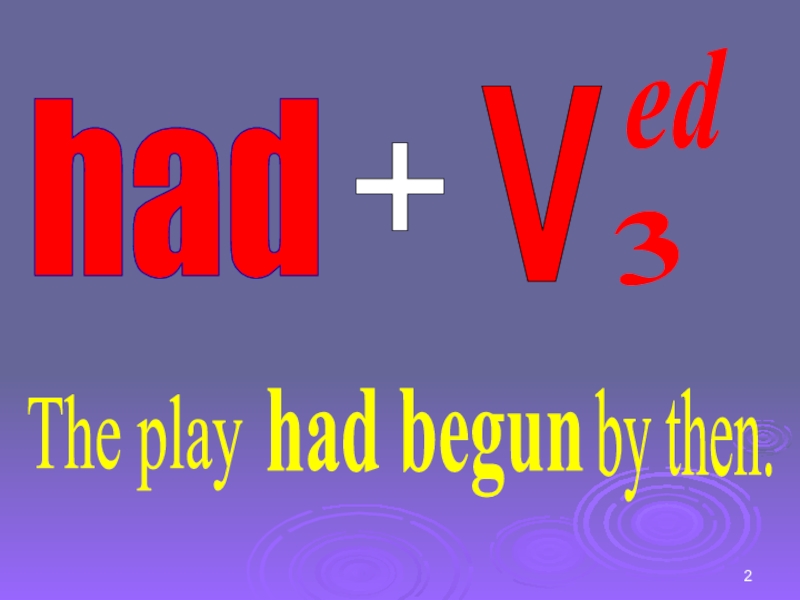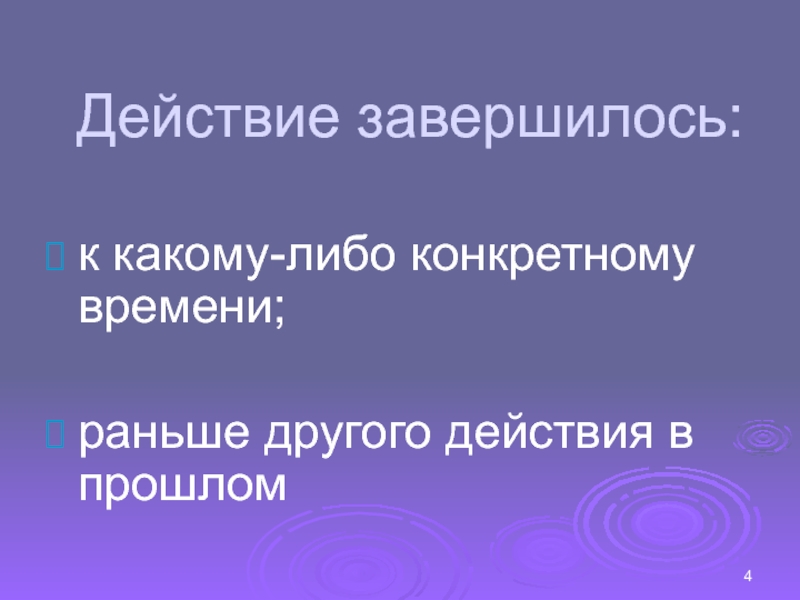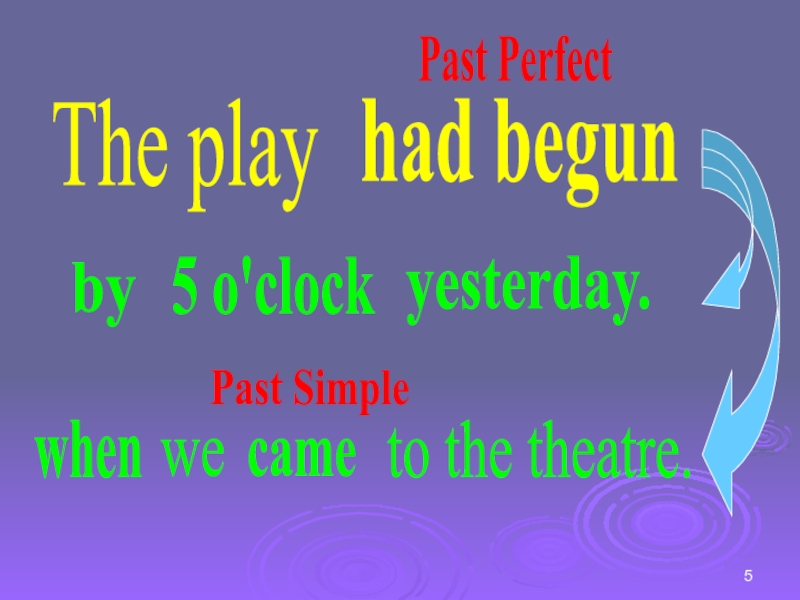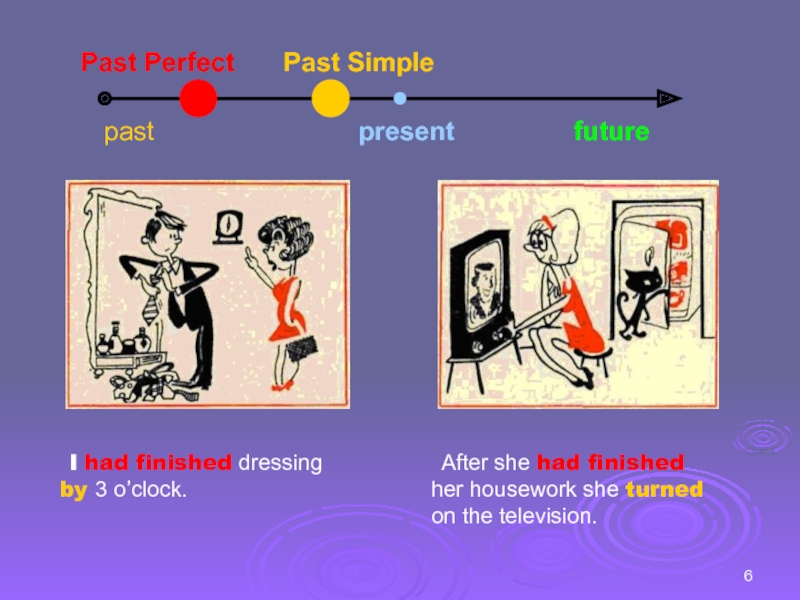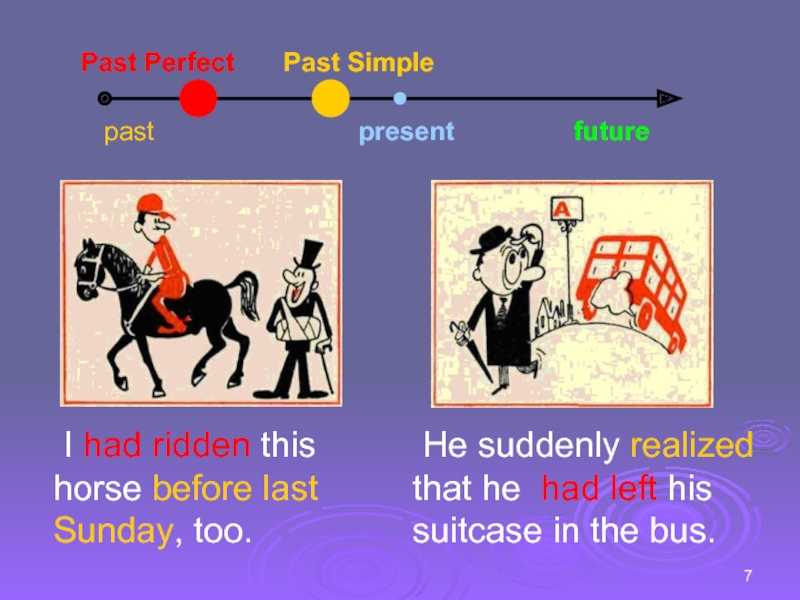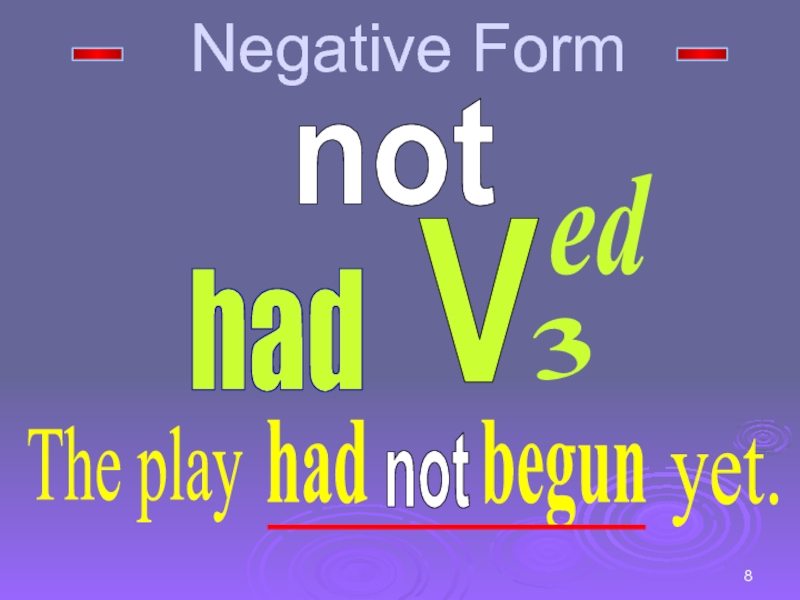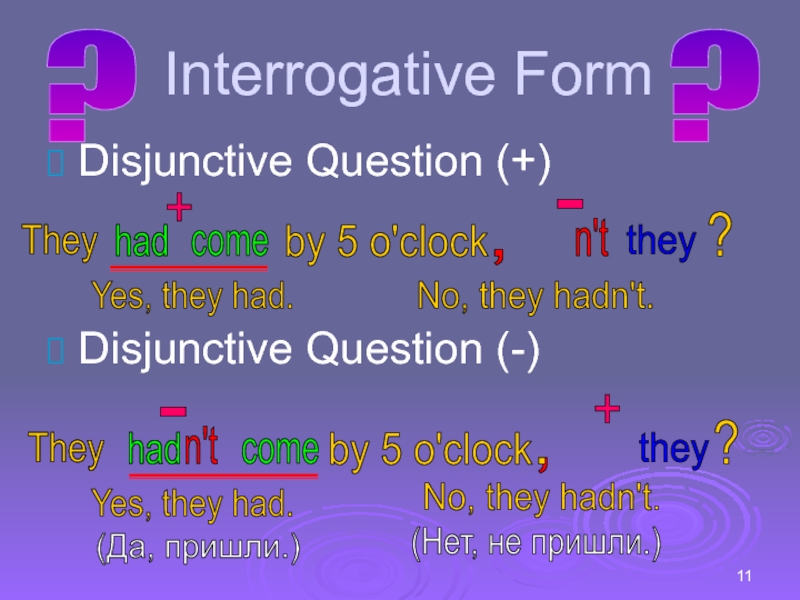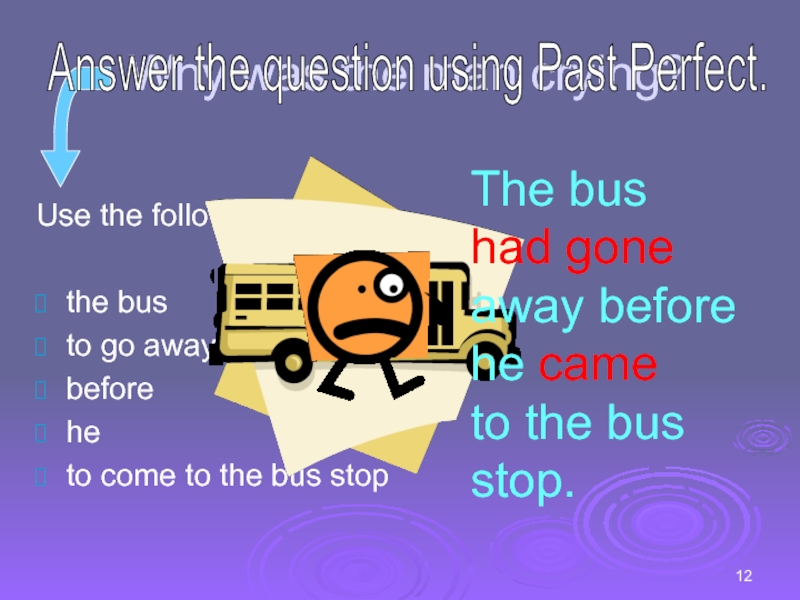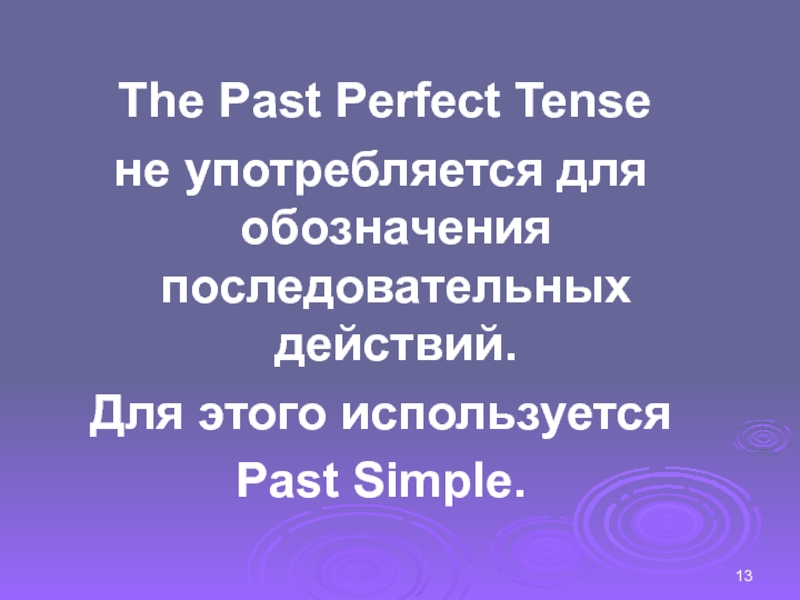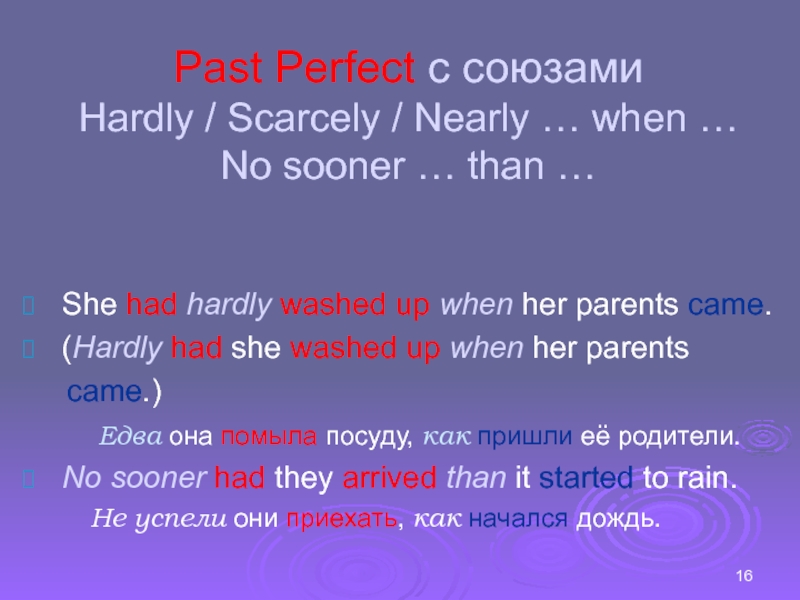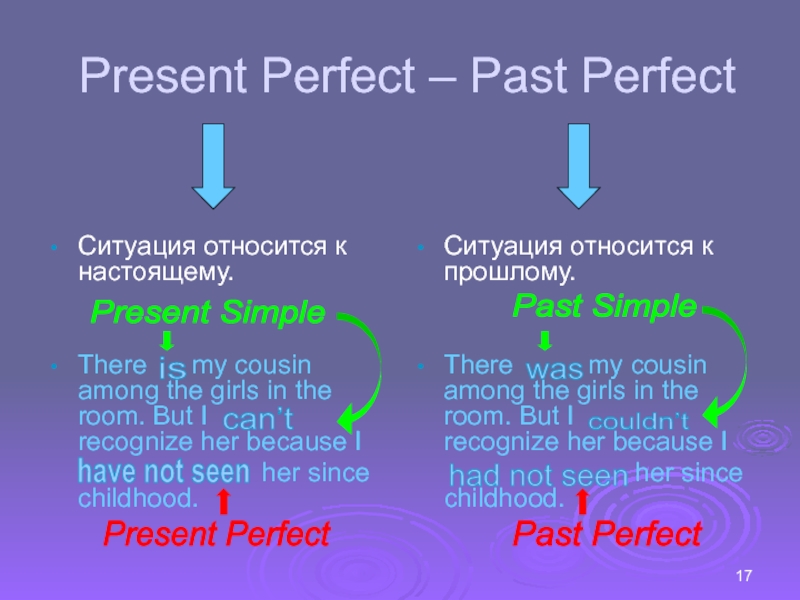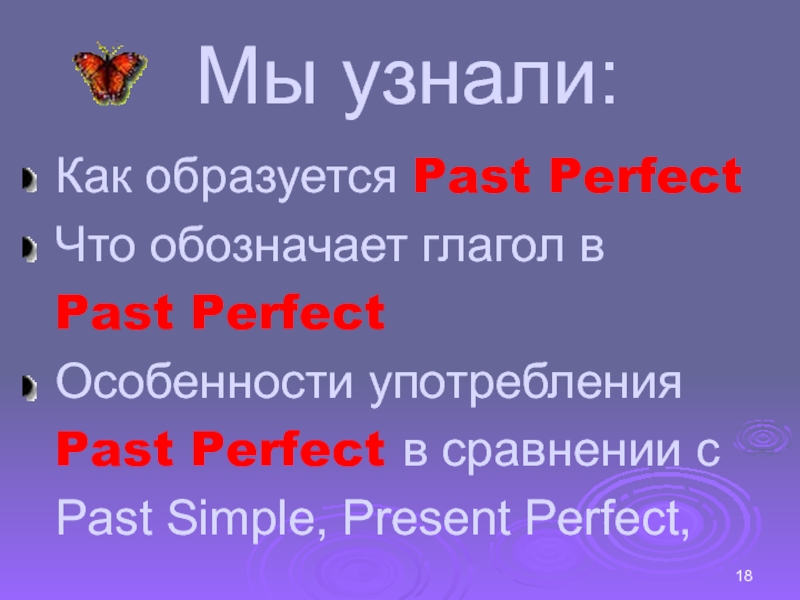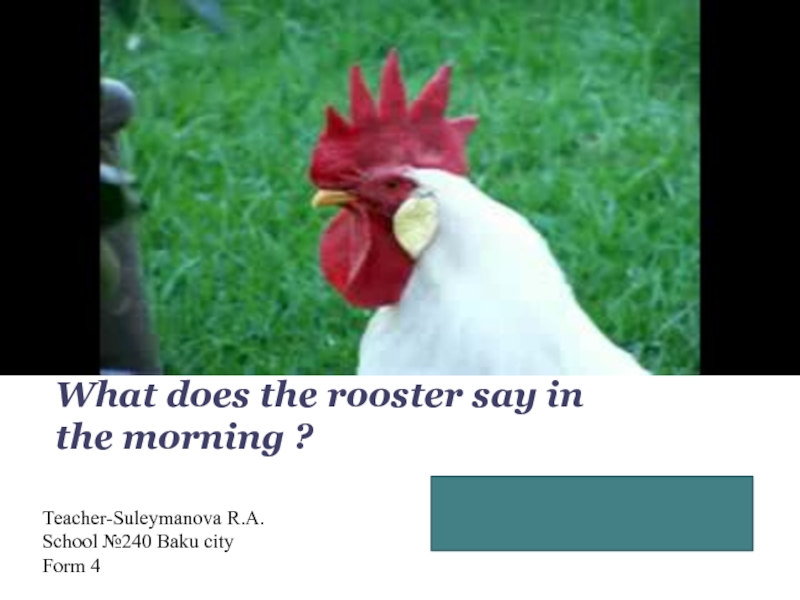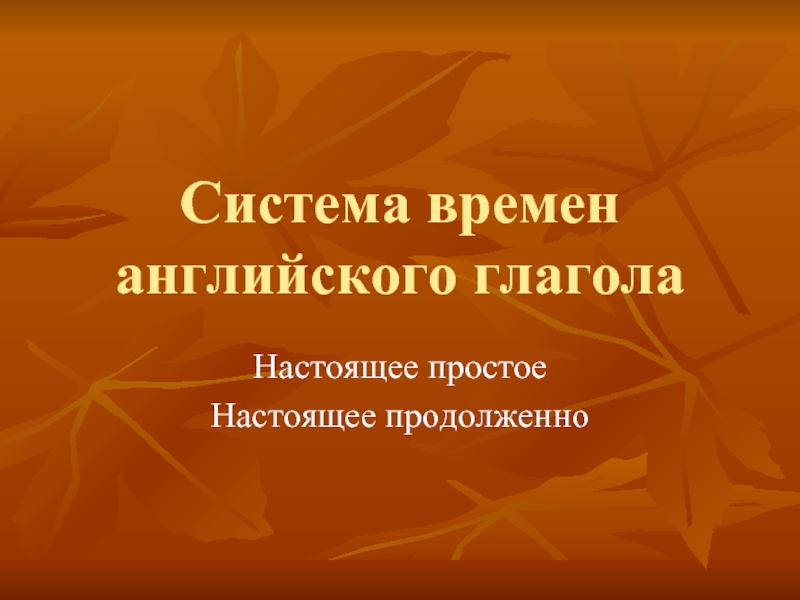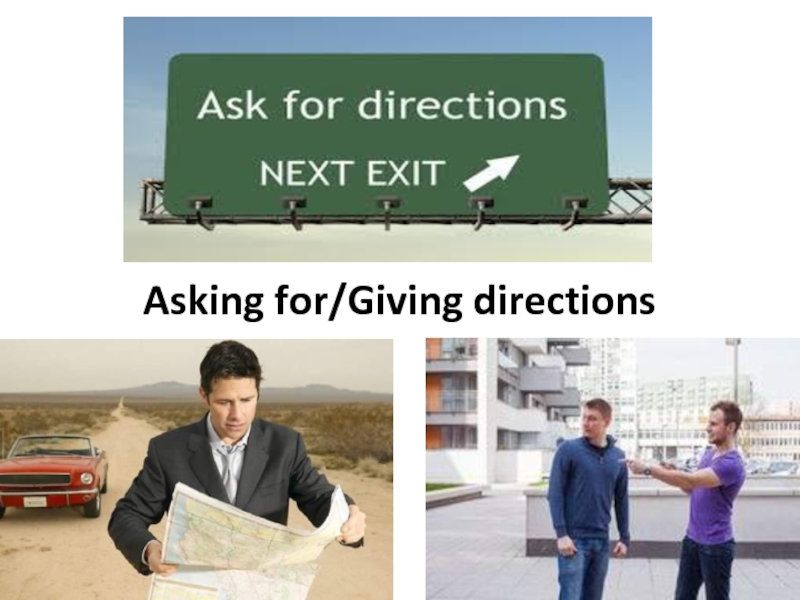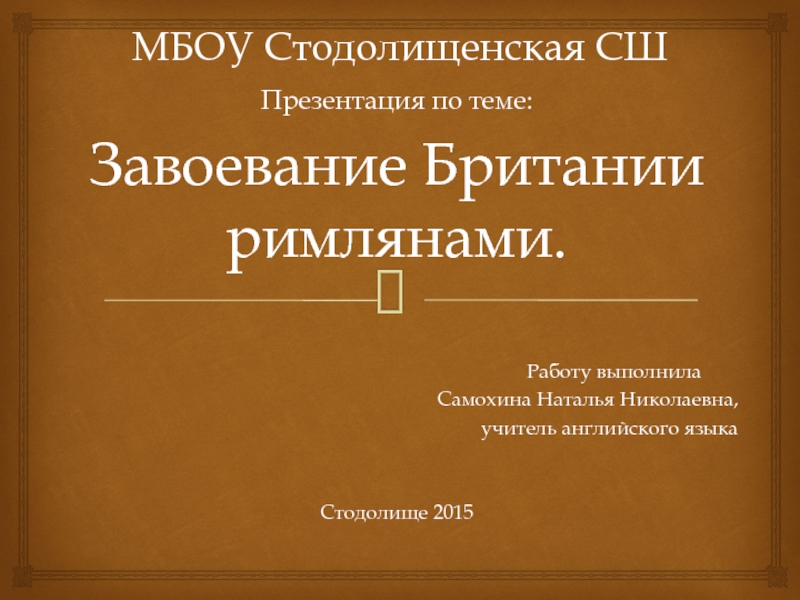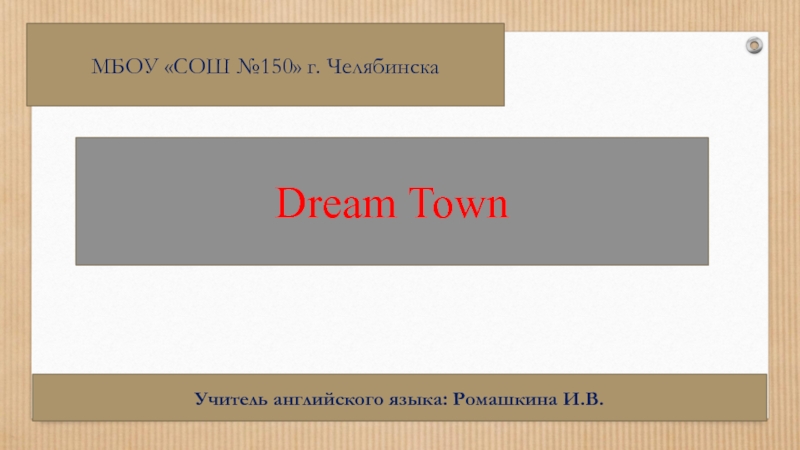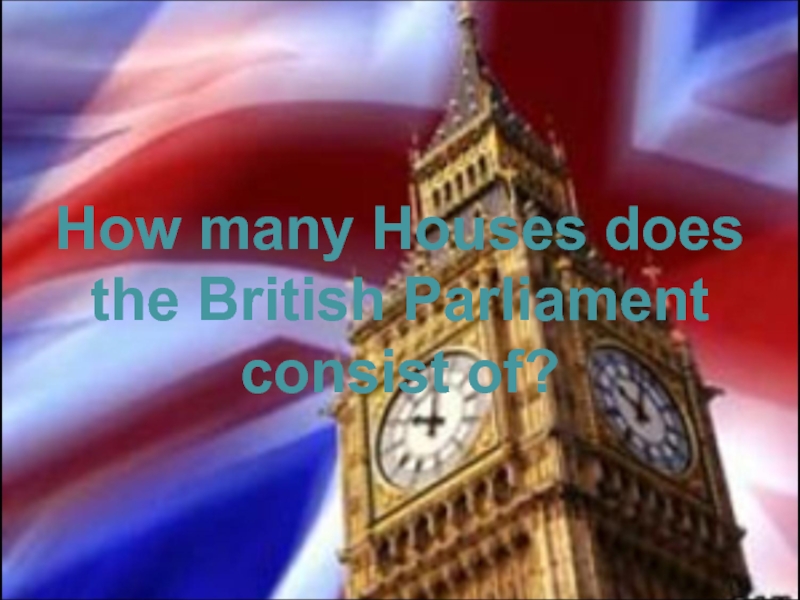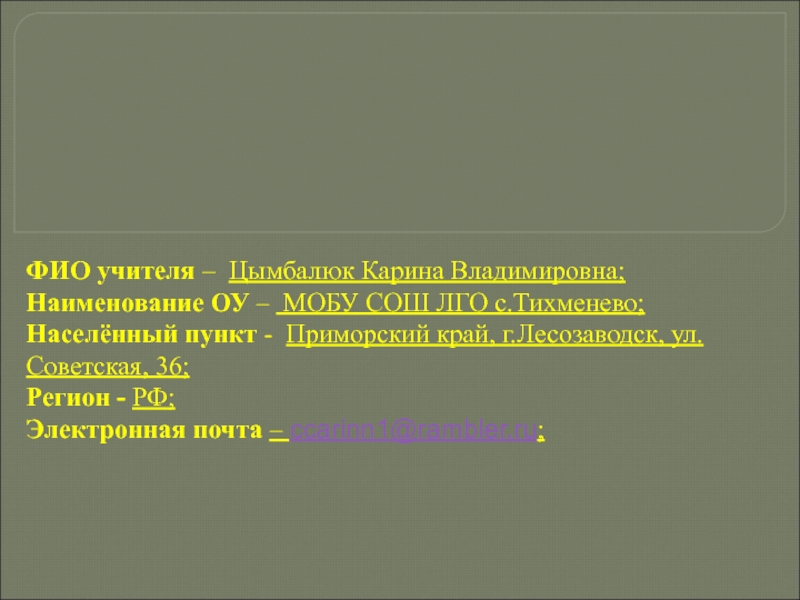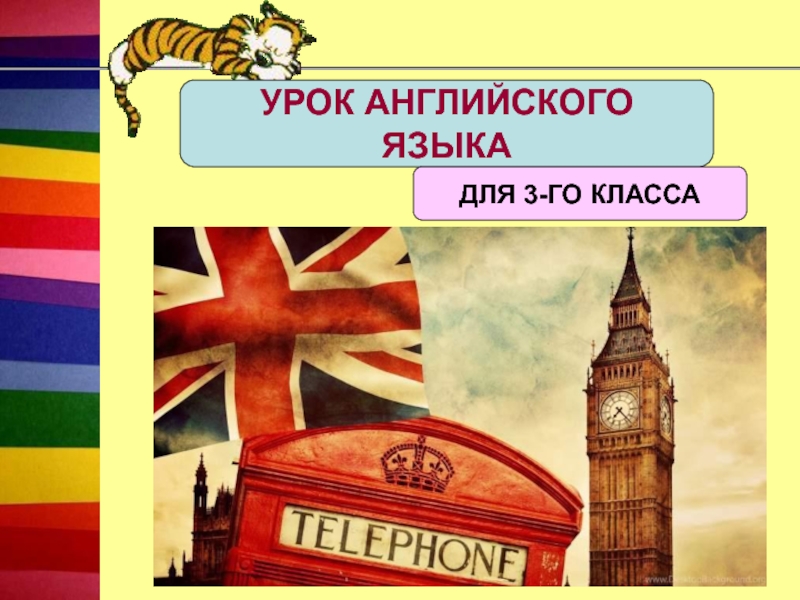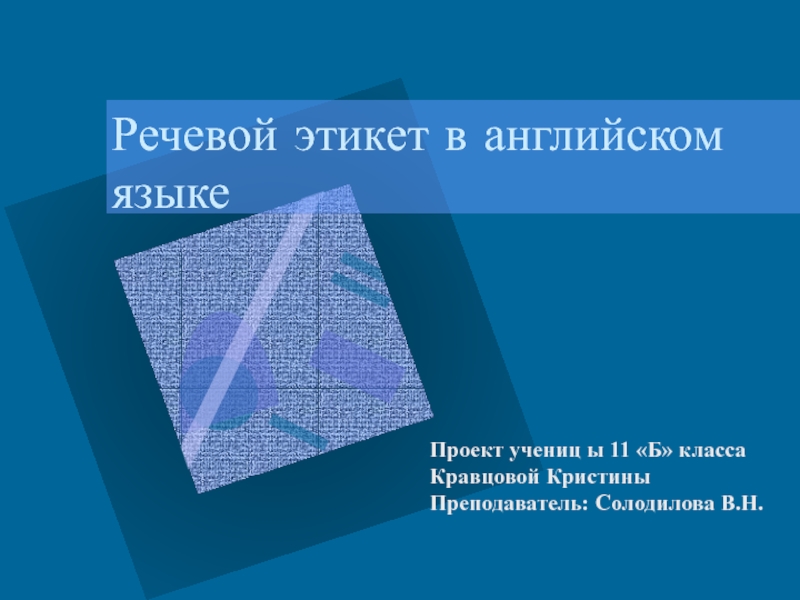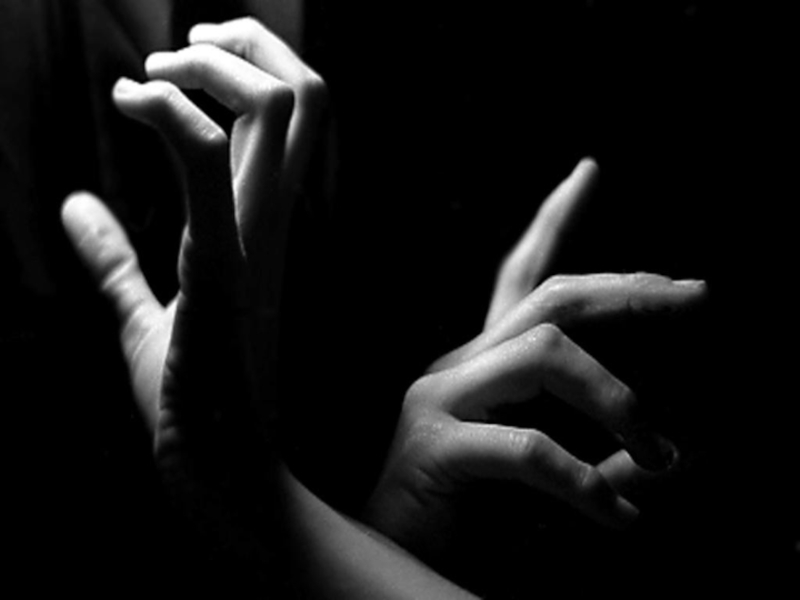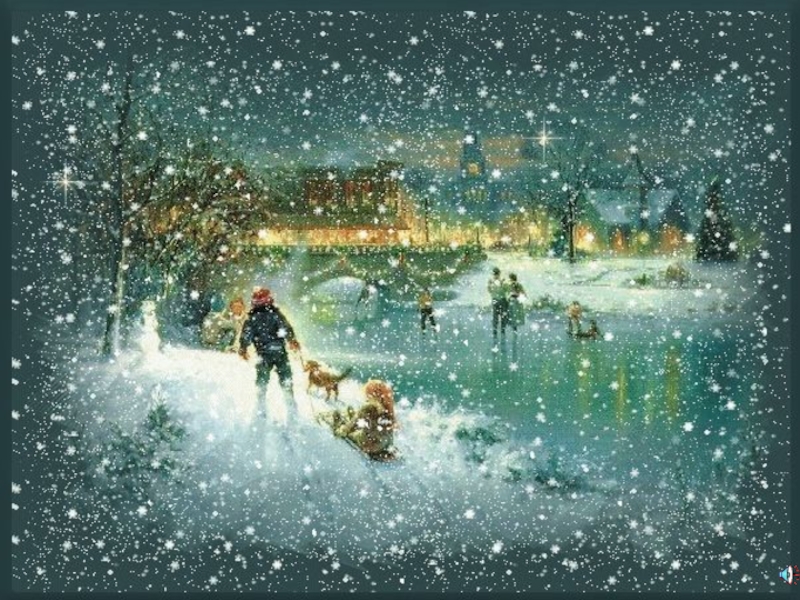Разделы презентаций
- Разное
- Английский язык
- Астрономия
- Алгебра
- Биология
- География
- Геометрия
- Детские презентации
- Информатика
- История
- Литература
- Математика
- Медицина
- Менеджмент
- Музыка
- МХК
- Немецкий язык
- ОБЖ
- Обществознание
- Окружающий мир
- Педагогика
- Русский язык
- Технология
- Физика
- Философия
- Химия
- Шаблоны, картинки для презентаций
- Экология
- Экономика
- Юриспруденция
Past Perfect Tense
Содержание
- 1. Past Perfect Tense
- 2. had+Ved3The playhad begun by then.
- 3. The Past Perfect Tense обозначает действие, которое
- 4. Действие завершилось:к какому-либо конкретному времени;раньше другого действия в прошлом
- 5. The playhad begunbyyesterday.5 o'clockwhenwecameto the theatre.Past PerfectPast Simple
- 6. presentPast SimplefuturepastPast Perfect I had finished dressing by
- 7. presentPast SimplefuturepastPast Perfect I had ridden this horse
- 8. Negative FormhadnotVed3The playhad begunyet.--not
- 9. Interrogative FormhadVed3??S
- 10. General QuestionSpecial QuestionSpecial Question (Subject)Interrogative Form by that timeby that time?by that time??TheycomehadHadtheyWhyhadtheycome.?HadThey.hadcome?Who
- 11. Disjunctive Question (+)Disjunctive Question (-)Interrogative Form by
- 12. Why was the man crying?Use the following
- 13. The Past Perfect Tenseне употребляется для обозначения последовательных действий.Для этого используетсяPast Simple.
- 14. Последовательные действия в прошлом Мистер Браун
- 15. Глагол, обозначающий действие, которое нарушает последовательность, употребляется
- 16. Past Perfect с союзами Hardly / Scarcely
- 17. Present Perfect – Past PerfectСитуация относится к
- 18. Мы узнали:Как образуется Past PerfectЧто обозначает глагол
- 19. Скачать презентанцию
Слайды и текст этой презентации
Слайд 3The Past Perfect Tense обозначает действие, которое завершилось раньше определённого
момента
в прошлом.
Слайд 6present
Past Simple
future
past
Past Perfect
I had finished dressing by 3 o’clock.
After she
had finished her housework she turned on the television.
Слайд 7present
Past Simple
future
past
Past Perfect
I had ridden this horse before last Sunday,
too.
He suddenly realized that he had left his suitcase in
the bus.Слайд 10General Question
Special Question
Special Question (Subject)
Interrogative Form
by that time
by that
time?
by that time
?
?
They
come
had
Had
they
Why
had
they
come
.
?
Had
They
.
had
come
?
Who
Слайд 11Disjunctive Question (+)
Disjunctive Question (-)
Interrogative Form
by 5 o'clock
?
?
They
come
had
.
,
n't
had
They
they
?
+
-
had
n't
come
by
5 o'clock
,
.
they
?
-
+
They
They
Yes, they had.
No, they hadn't.
Yes, they had.
No, they hadn't.
(Да,
пришли.)(Нет, не пришли.)
had
Слайд 12Why was the man crying?
Use the following words:
the bus
to go
away
before
he
to come to the bus stop
The bus
had gone away before
he
cameto the bus stop.
Answer the question using Past Perfect.
Слайд 13 The Past Perfect Tense
не употребляется для
обозначения последовательных действий.
Для этого используется
Past Simple.
Слайд 14Последовательные действия в прошлом
Мистер Браун
(1) в Лондон поздно вечером.
(2) в такси на вокзале, (3) в гостиницу,(4) в номер, (5) из чемодана пижаму, (6) душ,
(7) пижаму и (8) спать.
прибыл
Сел
приехал
зашёл
достал
принял
надел
лёг
,
,
,
,
,
1
2
3
4
5
6
Слайд 15Глагол, обозначающий действие, которое нарушает последовательность, употребляется в Past Perfect.
Мистер Браун прибыл (1) в Лондон поздно вечером. Сел
(2) в такси на вокзале, приехал (3)в гостиницу, зашёл (4)
в номер, который заказал (5) заранее, достал (6) из чемодана пижаму, которую ему положила (7) жена, принял (8) душ, надел (9) пижаму и лёг (10) спать
Past Simple
Past Simple
Past Simple
Past Simple
Past Perfect
Past Simple
Past Perfect
Past Simple
Past Simple
Past Simple
Слайд 16Past Perfect с союзами Hardly / Scarcely / Nearly … when
…
No sooner … than …
She had hardly washed up
when her parents came.(Hardly had she washed up when her parents
came.)
Едва она помыла посуду, как пришли её родители.
No sooner had they arrived than it started to rain.
Не успели они приехать, как начался дождь.
Слайд 17Present Perfect – Past Perfect
Ситуация относится к настоящему.
There
my cousin among the girls in the room. But I
recognize her because Iher since childhood.
Ситуация относится к прошлому.
There my cousin among the girls in the room. But I recognize her because I
her since childhood.
Present Simple
Present Perfect
Past Simple
Past Perfect
is
can’t
have not seen
was
couldn’t
had not seen

